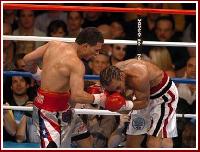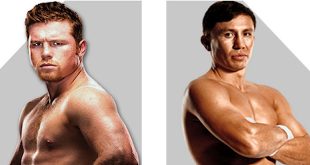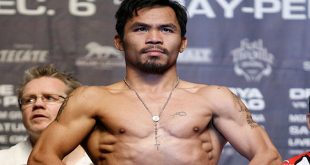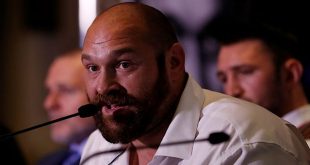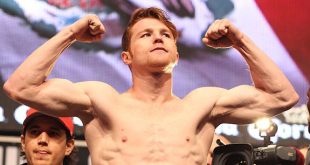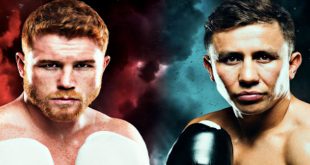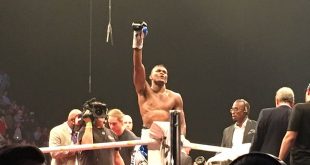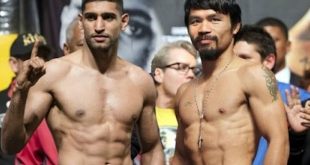mere prospect with much more to prove. Occasionally, it seems as if the boxing world chooses someone upon whom to place its hope, someone to carry the burden of our expectation. In 2005, it appears that Miguel Cotto is that fighter. Often, our hopes remain unfulfilled, as we forget that these individuals are mere mortals in an unnatural environment where weakness and cruel exploitation are inevitable companions. A precedent laid down by legends of yesteryear presents a problem for today’s fighters, as the quality of both words and deeds endure close scrutiny. Muhammad Ali charmed us with his predictive poetry then performed miracles, enchanting generations to come, beyond reproach as a marvel not only to the boxing world, but also to life in general. Marvelous Marvin Hagler and Tommy Hearns spoke of “War” in the ring and brought their vision into flesh in a fight still breathtaking to behold. Boxing is violence, sanitized for your viewing pleasure, but the expectation of a fighter to embrace the media factors greatly into what we deem suitable “entertainment.”
The hierarchy at Top Rank, Cotto’s promotional company, obviously realizes the necessity for the boxing public to embrace Cotto as more than just a fighter. In a campaign to launch Cotto as a true boxing superstar they have enlisted the expertise of public relations agents and translators to smooth Cotto’s transition to the English speaking public and media (Cotto understands and speaks English but chooses to communicate only in Spanish). Top Rank’s one inescapable problem in their plight is Cotto himself, who gives nothing of himself to the promotion of himself or his fights.
Cotto defers much of the questioning he apparently endures back to his promoters, offering short and stock answers such as: “That’s not my job,” or “I fight who they want me to fight.” Admirers of the strong, silent type might look at that and laud a no nonsense individual content to communicate only through his fists. However, it is no secret that Cotto is not to particularly fond of the sport in which he excels. Before Cotto fights, there are no headline grabbing quotes to savor or additional interest harvested by acknowledged grudges. Cotto negates the opportunities most other fighters exploit with the sheer vacancy of his responses.
Of course, simply because one fights and is successful, does not mean that one is pre-disposed to showmanship, and, we should not neglect the fact that some personalities are not geared to provide verbal pyrotechnics. Also, it is imperative to understand that I do not advocate outspokenness in terms of degrading opponents ala James Toney who, along with several others, aligns himself with the extreme negative of the promotional concept spectrum.
Definitively, fans seek a fighter to accept the challenge of becoming the embodiment of a hero: one that can succeed where others fail, that is larger than life itself and one that, even in defeat, maintains an honor and dignity befitting the sport. Felix Trinidad is one such individual. Years ago, Trinidad resembled little more than a titleholder with a reputation for power who provided ample excitement in his fights and yet, was lost to much of the boxing world through an unceremonious burialon the under-cards of other Don King promoted fighters. Then, Trinidad defeated Oscar de la Hoya. Furthermore, Trinidad scorched his way through two more weight classes, acquiring world titles in a prolific run that saw him winning world titles in new weights almost every other fight.
Trinidad not only possessed power in his fists, but also in his personality. It shone throughout the arenas he fought in, as did his love for his people and theirs back to him. Even though Trinidad cannot fully embrace the English-speaking sector of the industry, linguistics has not prevented him from earning his deserved place in their affections. Cotto shares Trinidad’s Puerto Rican heritage, but when Trinidad enters the ring, he takes the love of an entire nation with him; Cotto takes respect and expectations which he must satiate.
Worse still for Cotto is the farcical conclusion of his last fight. Thought to be considerably overweight, Cotto struggled with DeMarcus Corley before enjoying a nonsensical stoppage before the midway point of the fight. Undeniably shaken and on the verge of a first defeat, the enduring feeling of that fight is that Cotto’s skin was saved by somewhat over-zealous or downright dubious officiating. And yet, it was not the first time that Cotto struggled to see off a more experienced foe; he puffed and panted his way through the stern challenge of Australia’s Lovemore N’dou.
Not long ago, the trick amongst boxing fans was to try to explain flaws in Cotto’s armor. Now, almost defeated by a modest threat, struggling through stamina problems and competing at a seemingly inappropriate weight class, some weaknesses finally surface. If the weight of expectation and criticism is unfair, it is matched in volume only by the adulation a fighter receives upon exceeding the call of duty. Miguel Cotto possesses superstar potential, but in realizing it, the battle to undo his reluctance towards publicity will likely be the most challenging obstacle to conquer.
Jim Cawkwell can be reached at jimcawkwell@yahoo.co.uk
 Boxing News Boxing News
Boxing News Boxing News
